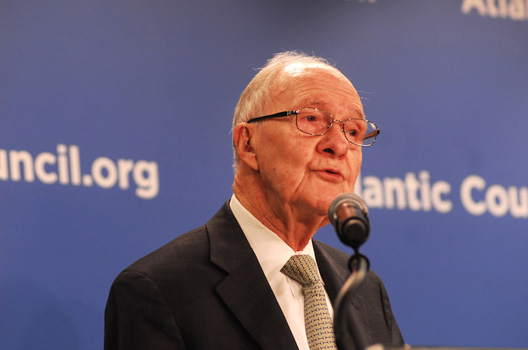 In facing the challenges of the world today, leaders and policymakers can draw on examples from the past in order to create hope for the future. As described by Fred Kempe, president and chief executive officer of the Atlantic Council, one such example can be found in the late Gen. Andrew J. Goodpaster, a military leader and statesman who worked through the twentieth century to help establish the current rules-based global order.
In facing the challenges of the world today, leaders and policymakers can draw on examples from the past in order to create hope for the future. As described by Fred Kempe, president and chief executive officer of the Atlantic Council, one such example can be found in the late Gen. Andrew J. Goodpaster, a military leader and statesman who worked through the twentieth century to help establish the current rules-based global order.
The Life and Work of General Andrew J. Goodpaster: Best Practices in National Security Affairs by C. Richard Nelson is a biography detailing the renowned general’s life and the ways in which he embodied “the defense of values, the defense of constructive leadership in the world alongside friends and allies to create a more secure future,” said Kempe.
Kempe introduced an event on January 31 hosted by the Atlantic Council’s Brent Scowcroft Center on International Security and the Transatlantic Security Initiative to discuss Nelson’s biography, celebrate the life of Goodpaster, and learn from his example.
Goodpaster was not only a military leader who served in both World War II and the Vietnam War, he was also a presidential adviser who served through seven successive administrations. In particular, he served as US President Dwight Eisenhower’s staff secretary and helped to establish NATO. He then served as Supreme Allied Commander Europe (SACEUR) from 1969 to 1974.
Retired Lt. Gen. Brent Scowcroft, president of the Scowcroft Group and chairman emeritus of the Atlantic Council’s International Advisory Board, delivered a keynote address in which he recounted his personal and professional relationship with Goodpaster. Scowcroft described how Goodpaster’s work and experience spanned eras of global transition and immense geopolitical challenges. Nelson’s book, he said, provides valuable lessons for today’s leaders in the face of renewed threats to the established world order.
“In the times of great transition [that] we face today… both in the United State and globally, Goodpaster’s best practices in national security and decision-making are a lesson we should not forget,” said Scowcroft.
Susan Eisenhower, chairman emeritus of the Eisenhower Institute at Gettysburg College, also spoke, detailing through a series of anecdotes her relationship with Goodpaster and praising his exceptional leadership.
Kempe moderated a discussion with Lewis Sorley, both a historian and personal friend of Goodpaster’s, to discuss Nelson’s book. Not only did Goodpaster play a crucial role in establishing the current global order, said Kempe, but Sorley further described how his life exemplified endurance through adversity and informed his career in national security. He said Goodpaster was an honest and relatable leader who inspired others; people believed they could trust him and that he would represent their concerns. “He had no interest in advancing one person, [element, or party] over another. His interest was in advancing the United States,” said Sorley.
In this way, said Kempe he was “a person who was able to navigate these moments of history and play a crucial role across administrations,” overcoming political factions for the sake of a greater good.
In particular, Sorley said many lessons for today’s leaders can be learned from Goodpaster’s approach to national security concerns. He described how, as SACEUR, Goodpaster maintained five to six major priorities, written on an index card. He kept that same index card for nearly the entirety of his tenure, said Sorley, demonstrating a long-term strategic approach to the global security environment. Goodpaster’s method, to “prioritize, stick through it, and be an honest broker on top of it,” is an important lesson for today’s leaders, said Kempe.
A hostile Russia was among Goodpaster’s top priorities as SACEUR, said Sorley, testifying to the relevance of his experience for today’s geopolitical landscape.
Sorley said that, at a time when the world order he helped to establish is under siege, Goodpaster’s life can serve as a model for those who would seek to uphold its values. “Today, Gen. Goodpaster would have sized up the situation, prioritized, and would have done that in an effort to bring together everyone he could influence to do one thing…serve the good of the republic,” said Sorley.
While commemorating an example from the past, Sorley also asserted his hope for the future, noting that there are plenty of people today with Goodpaster’s same capability. Kempe echoed Sorley’s optimism, saying there is a great deal of talent among principled individuals working through the transition to US President Donald Trump’s new administration. “I have every hope that the collective influence of people like that… will help us now,” said Sorley.
Rachel Ansley is an editorial assistant at the Atlantic Council.
Image: “Strategy is the framework that gets a state thinking about how to get where it wants to go, but first you have to know where you want to go,” Brent Scowcroft, who served as National Security Advisor to Presidents Gerald R. Ford and George H.W. Bush, said at the Atlantic Council on March 13. (Larry Luxner / Atlantic Council)
